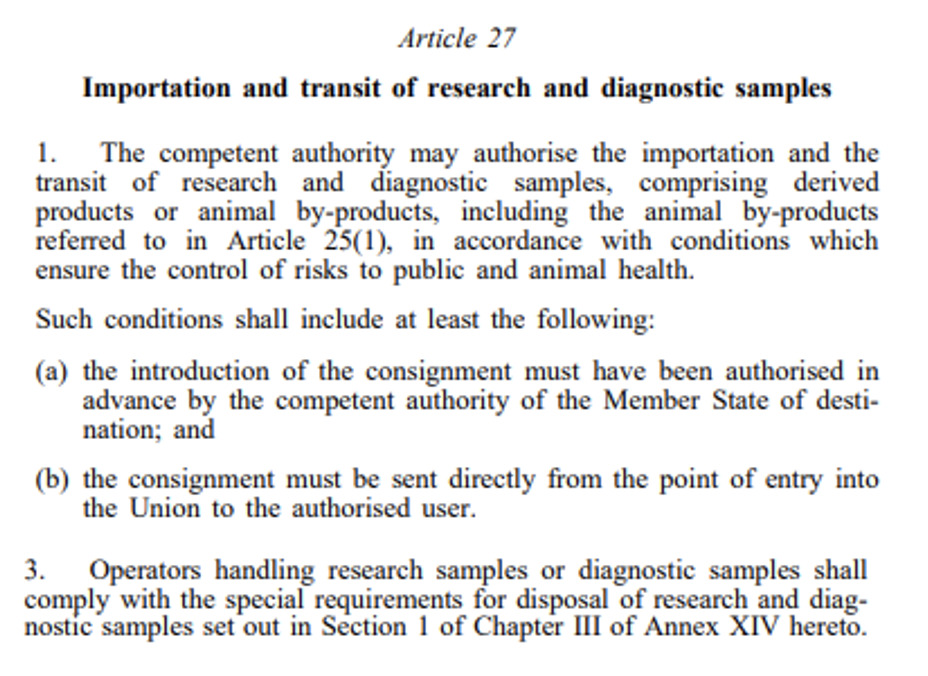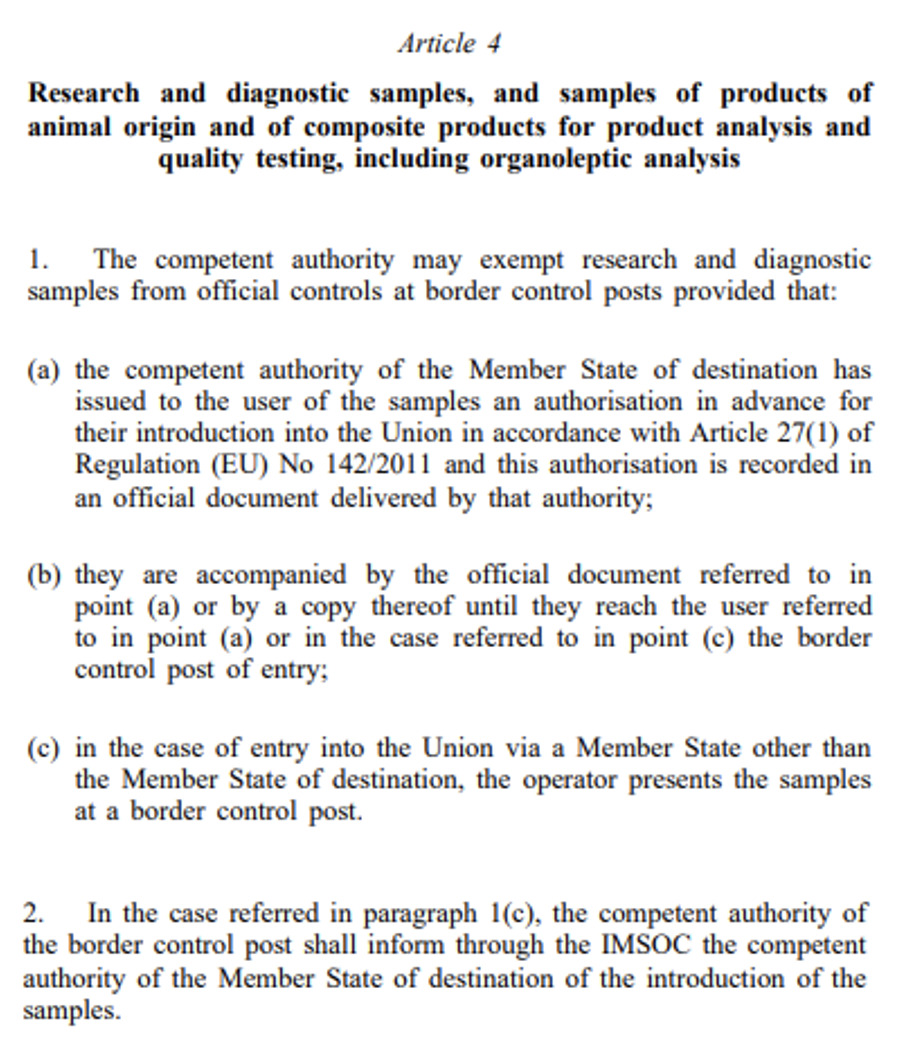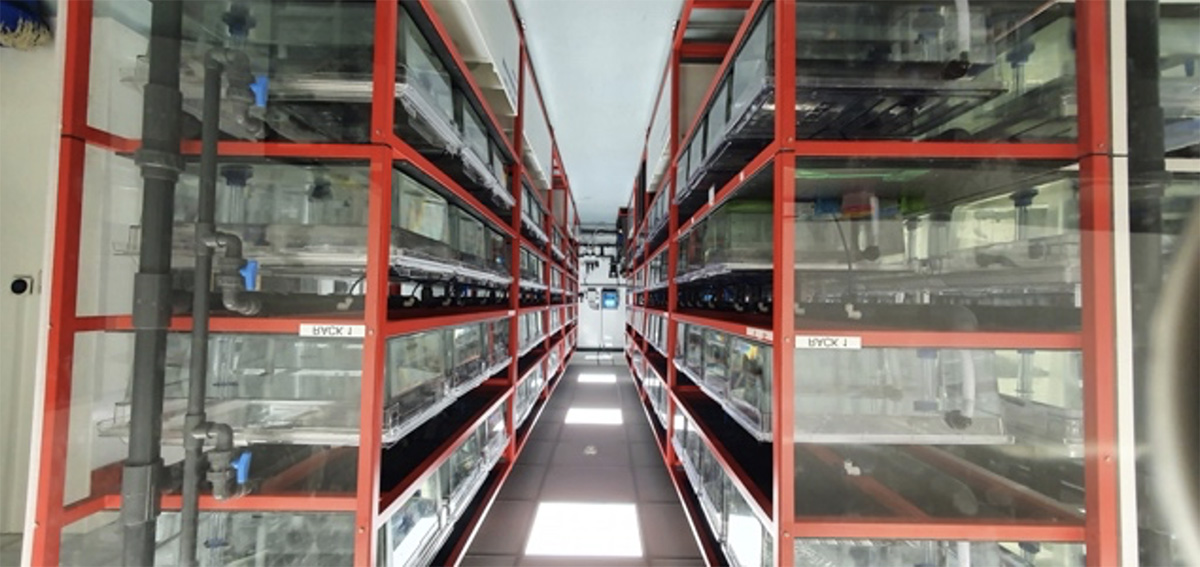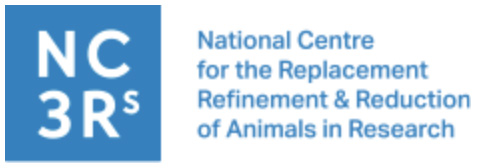 News from the EXRC Autumn 2022
News from the EXRC Autumn 2022
Hello fellow Xenopus Researchers,
The EXRC team hopes you are all well and that your experiments are being successful.
Here we are undergoing a very substantial transformation after 16 years of serving the community, so large indeed that we’ve called the project EXRC V2. We guess you all know that there was an outbreak of M. ulcerans ecovar liflandii here that required a major cull of animals to prevent suffering. Although this left the team devastated it has enabled the transformation. The two main frog rooms have been cleared and re-equipped, increasing the capacity of the centre by 50% and allowing us to adopt the practice of keeping the main part of the colony “clean”. Only embryos that have undergone treatment with thimerosal and ethanol go into 4 of our rooms and it is from these that animals will be supplied. The work, which resulted from a huge effort by the animal technologists in the team and MBK Ltd, was completed by October 1. The 4 “clean” rooms are being populated with tadpoles, with froglets or frogs growing in them now. Here are some pictures:
The security of the transgenic/mutant lines was challenged by the disease outbreak, which included these libraries, but the good news is that between our frozen sperm stocks and the duplicate animals at NXR no established lines were lost and Ania has already got the lost new (F0) lines growing.
In terms of wild-type animals, the first of the clean animals will become available from April 2023. We currently have small numbers of X. tropicalis males and females available, they are perfectly healthy but not from the new clean colony.
Many labs are already booking the first groups of animals available so please contact us if you can already foresee a need.
For transgenic lines the availability varies lots so please contact us on EXRC@xenopusresource.org. If you need a knockout or transgenic line made, we are now able to take orders again.
Throughout the period when we could not supply animals several labs used Xenopus products: testes, frozen sperm, oocytes or embryos to enable them to continue to work. We can supply these now but until the new frogs become adults the supplies, particularly of embryos, are limited. If you want this sort of resource, please give us as much notice as you can – there is a short waiting list.
The molecular resources are still being used regularly, the fosmid, BAC and ORFeome libraries together with the expression plasmids and in situ probes are all available. We have been working on characterising the Maller lab collection of antisera that recognise cell cycle control proteins and the outcomes of this, together with data from testing commercial monoclonal antibodies predicted to work on frog proteins is starting to appear on our updated EXRC website now.
We are currently preparing the new application to fund the EXRC from September 2023 and it will really help us to prepare this if you can help us to prioritise your needs from the centre by taking a few moments to fill in this survey if you have not yet done so: European Xenopus Resource Needs Survey 2022
Please remember it is your centre and we run it to support your research, so it is critical that we understand your needs.
In summary then the EXRC has almost completed the process of expansion and is up and running normally again except for the limit on live animal availability over the next 9 months. By October we shall even be able to take in new lines of frogs so if you have lines that are not yet deposited, please contact us to arrange collection – we can hold them “invisible” until they are published.
This is all positive but moving animals and animal products is providing major challenges. Since the UK left the EU, it has become very much more difficult, indeed almost impossible, to send these critical resources to many countries in mainland Europe. Magda is managing this with significant success, but it is almost a full-time job in itself – here are her thoughts on the current situation. Please take a few moments to read the sections relevant to you. Any updates will appear on our website as they become available.
Transport of amphibia and amphibian products essential for biomedical research from the UK to EU countries.
We now need an Export Health certificate (EHC) specifically for amphibia and amphibian products for any country we export to. Working together with users we now have these for:
- Belgium
- Czech Republic
- Denmark
- France
- Ireland
- Northern Ireland
- Poland
- Spain
All shipments that require an EHC may incur an additional fee (~ £400) due to the mandatory requirement for the vet’s signature. We shall aim to send multiple shipments on the same day, that will enable the fee to be split between the recipients. You will see from the examples below that the cost of live animal shipments is high (typically between £1400 and £2000). We are at a very early stage of investigating using the new Xenopus facility at Freiburg to hold large batches of frogs from the EXRC for onward distribution from there – this may make a very cost-effective way of getting frogs to users on the European mainland, but it will need some financial support. Here are some detailed examples of how we can move frogs and testes, oocytes and embryos (by-products or products of animal origin in the parlance of animal regulations). If they are applicable to you and you need access to any documents we will help wherever we can, please get in touch.
All shipments of live animals and animal by-products outside of the UK must be accompanied by a commercial invoice specifying the Harmonised Tariff Code (HS), which classifies the commodity sent. Those we use are:
|
Product type
|
Recommended commodity code
|
| Frog testes | 05.10.00.00.00 |
| Frog sperm | 05.11.99.85.90 |
| Frog oocytes | 05.10.00.00.00 |
| Frog embryos | 30.02.90.90.90 |
You should however check that these are suitable for your transport needs before using them.
We move all of our animal shipments with specialised animal couriers (Impex info@impex-uk.com or Barbican Logistics sales-air@barbicanlogistics.com).
Animal by-product shipments are booked with our trusted courier Express International which uses Fedex (or DHL on request) to fulfil the international part of the delivery.
Below is the shipping information we have collated so far for the EU countries, we will send out updates and additional information as we get them:
FRANCE
Option 1. Animal by-products only
One of our French customers managed to obtain a registration number under the decree of 8th December 2011 (example below), which enabled prompt deliveries. Should you have this registration number, please provide it when requesting the resources or apply for it so it can be added to the paperwork. This way we would be in a better position to ensure fast delivery. Since we’re often sending embryos, the timing is crucial.
Option 2
We apply for an EHC (export health certificate) from APHA (Animal & Plant Health Agency) on your behalf. This will require an official vet’s signature, which shall incur an additional cost of approx. £400 (see above)
2.1. We have never sent animal by-products via our standard courier service but accompanied with an EHC, therefore I cannot comment whether it would prevent any delays (I would imagine so though)
2.2. We can send the embryos or other by-products with a specialised animal courier AND the EHC. This service will likely cost £2,000 as shipped with a specialised animal courier
Live animals
We will apply for an EHC (export health certificate) and ship with a specialised animal courier
SPAIN
Live animals
We will apply online for an EHC to export amphibians to Spain. This will incur an additional fee as our vet will need to come to inspect the animals to sign them off (see above). Plus, we will need to send the resources as live animals using a specialised animal courier so the cost might reach £2,000.
If we are sending reagents, we only need to specify the Harmonised Tariff Code as 38-22
If, however, it’s biological material (animal by-products), we have to complete Annexo II, IV and submit them with the rest of the attached documents more or less a week before you wish to receive the order.
In total we require the following paperwork to go with by-products to Spain:
- Annexo II
- Annexo IV
- A letter where we explain the purpose of the material, the responsibility of the correct use of the product, and it’s important to specify that it is not for commercial use. (Carta de Uso y destino)
- Commercial invoice
GERMANY
Animal by-products
- A reagent breakdown for non-fixed samples is required together with an import licence (which is Bundesland-specific) for animal derived tissues that are not fixed, e.g: gks.vetleb@stadt-koeln.de (https://www.stadt-koeln.de/service/produkte/00616/index.html)
- For fixed samples the following declaration must be clearly stated on the exterior packaging:
“Biological material for research use only. Tissue is fixed and stored in 4% Paraformaldehyde/Formalin and all potential infectious/dangerous biological agents were killed off.”
“Biologisches Material ausschließlich für Forschungszwecke. Gewebe ist fixiert und gelagert in 4%Paraformaldehyd/Formalin und alle potenziell infektiösen/gefährlichen Lebewesen wurden abgetötet.”
For live animals no EHC is currently available (note that on the website referred to above the requirement for an EHC for animal by-products is implied but we have not so far found it to be the case). This needs addressing – we are doing all we can from our end but if you are thinking of importing animals then we suggest you contact us to give us help asap.
The office for genetic engineering has provided the following information:
In the specific case subject to your request – export of genetically modified frogs and frog gametes from the United Kingdom to Germany – we assume that the transport takes place between laboratories (GMO intended for contained use). Aspects of genetic engineering law to be considered in this case are outlined in the following. (Please note that still other regulations apply should the purpose of the import be another than for contained use. Import of patterns of pure DNA and/or protein are not subject to legal regulations relating to genetic engineering).
- As parties to the Cartagena Protocol on Biosafety to the Convention of Biological Diversity, exporters must abide by the rules governing contained use and transport of GMO as stipulated in Regulation (EC) No 1946/2003, namely, the GMO consignment must be accompanied by specifying documents (Article 12 of the Regulation). Please find a template for the accompanying document in Annex 3a of the leaflet “Merkblatt_Export_GVO-1946_2003” which is attached to this e-mail.
- According to § 17(b) of Germany’s Act regulating genetic engineering (GenTG), the label or the accompanying document to the consignment must show the warning “This product contains genetically altered organisms.”
- In addition, the regulations both of the importing and the exporting country concerning the transport of dangerous goods must be followed. If you have specific questions on that and on the relevant regulations in Germany, please refer to the Federal Institute for Materials Research and Testing (BAM), Division 3.1, “Dangerous Goods Packagings” (e-mail: gefahrgutverpackungen@bam.de ). Details on containment and packaging provisions are to be found in pertinent international agreements:
- Agreement concerning the International Carriage of Dangerous Goods by Road (ADR) – web link: https://unece.org/adr-2021-files
- For transport by air, you have to comply with IATA’s Dangerous Goods Regulations (https://www.iata.org/en/publications/dgr/#tab-1 ).
Beside these provisions, you may have to observe animal health requirements in line with European legislation (Regulation (EU) 2016/429 and corresponding legislation). The Federal Ministry of Food and Agriculture, unit 323 (323@bmel.bund.de), will be able to answer questions relating to animal health requirements in more detail.
Last not least, any transport of vertebrate animals that is linked to a commercial activity, needs to comply with the animal welfare requirements of Council Regulation (EC) No 1/2005.
ESTONIA
Importer/ Receiving institution are to contact the Border Control Department (Agriculture and Food Board):
“(…) for each consignment of such animals/animal products we need an application from Estonian recipients/importers to receive our special import requirements or our special import permission to allow import of such animals/products without border veterinary controls.”
NORWAY
This process is under the Norwegian Food Safety Authority’s area of competence. Any scientist, scientific institution etc wanting to import animals and animal products for research purposes needs an import permit from this Authority.
Homepage: https://www.mattilsynet.no/language/english/
E-mail: postmottak@mattilsynet.no
CYPRUS
Invertebrates (N.B. this is the response to my request for information about frog imports and may be in error – I shall follow up though) intended for scientific purposes are exempted from official controls at border control posts, provided that:
- the user must have the relevant permit from the Veterinary Services in order to use live animals for scientific purposes;
- their entry into Cyprus is authorised in advance for that purpose so the user has to apply to the Veterinary Services for an import permit;
- they are accompanied by an ordinary health certificate stating that the animals are free of diseases;
- when the activities related to the scientific purposes have been carried out, the animals and products derived from them, with the exception of the quantities used for the scientific purposes, shall be disposed of or re-dispatched to the third country of origin.
Regarding research and diagnostic samples the Veterinary Services issue to the user of the samples an authorisation in advance for their introduction into the country.
CZECH REPUBLIC
The requirements for the import of live amphibians for the research purposes are:
- The recipients of animals have to be approved in advance by the RVA as an approved establishment. For a quick contact the RVA concerned is possible to use the following link https://www.svscr.cz/prehled-elektronickych-podatelen/
- The imports of amphibians have to be authorised in advance by our office at the CVA SVA. It means that the importer, his/her representative or other person responsible for the consignment shall ask the CVA SVA in advance for the establishment of veterinary conditions for the import of each consignment of the animals (i.e. import permit) in question. It means that your partner in the Czech Republic must contact us to ask for an import permit for each consignment.
The application shall include:
- animal species,
- number of animals in consignment,
- place of origin of animals,
- the name and address of the exporter,
- the name and address of the consignor,
- the name and address of the consignee,
- the place of destination (name, address and CZ approval number),
- the purpose of use.
The application for the establishment of veterinary import conditions shall be sent via e-mail to the following address: epodatelna@svscr.cz a minimum of 15 days in advance of entry of the consignment to the territory of the Czech Republic.
PORTUGAL
Samples for the purpose of products of animal origin, animals or their parts for the purpose of laboratory research and diagnosis are not covered by veterinary import controls at a Border Control Post (BCP), but are subject to prior authorization issued by the Directorate General for Food and Veterinary.
The requirements considering imports of samples of products of animal origin can be consulted on the DGAV page, in the following location:
https://www.dgav.pt/comerciointernacional/conteudo/importacao-de-paises-terceiros/generos-alimenticios-e-subprodutos-de-origem-animal/amostras-para-investigacao-e-diagnostico-laboratorial/
The operators shall ensure transportation, use and disposal of samples for research and diagnosis under conditions that guarantee the control of risks to public and animal health. Consignments of these samples must be accompanied (from origin) by a commercial document that must specify:
- description of the material and the animal species of origin;
- the category of materials (materials are classified as 1, 2 and 3 in accordance with REG. (EC) No 1069/2009;
- the quantity of the materials;
- the place of origin and the place of dispatch of the material;
- the name and address of the consignor;
- the name and address of the consignee;
- the name and address of the consignee and/or user.
The samples must be labelled with the text: “Intended for research and diagnosis”
The laboratory of destination of the consignments must be registered with the DGAV as a user of animal by-products and derived products for specific purposes, appearing on the list, which may be consulted at:
https://www.dgav.pt/alimentos/conteudo/subprodutos-animais/classificacao-e-destino/ in the item Estabelecimentos e Operadores de Subprodutos de Origem Animal – Regulamento (CE) n.º 1069/2009
If the Laboratory is not registered the Directorate for Food Safety Services (DSSA) should be contacted at seguranca.alimentar@dgav.pt, tel. +351 213 239 500, for registration purposes.
For the purposes of issuing the Import Permit for Research and Diagnostic Samples, an application for importation of samples shall be submitted to this Directorate General to the e-mail address: secretariadoDIM@dgav.pt, made by the laboratory of destination (researcher or person responsible for carrying out the test), and the import permit shall be issued by the DGAV in its favor.
The request for authorization shall be separate for each type of sample/origin/destination and shall contain the following elements:
- Description of the materials and the animal species of origin (in Portuguese and English);
- Category of the materials,
- Quantity of the materials;
- Place of origin and place of dispatch of the materials;
- Name and address of consignor;
- Name and address of consignee and/or user;
- Description of packaging including labelling and conservation (in Portuguese and English);
- Estimated date of arrival and waybill (if already in customs);
- Copy of the commercial document, or in its absence, the consignment may be accompanied by a document containing the same elements issued by the research center responsible for the shipment (at least in English).
- Indication of fax number and official e-mail address (addressee/importer)
- Statement of commitment by the applicant entity to proceed with the import, use, destruction and registration of the samples and their remainder in accordance with the above.
Regarding the entry of live animals and germinal products (semen, ova and embryos, including hatching eggs) for scientific purposes, an authorisation of entry is needed from our side, to be required by the establishments of destination in Portugal that must be approved for that purpose.
That authorisation establishes that these animals/germinal products must be properly packed and in a way to permit their identification, that they cannot be used for other purposes than those for which they are intended, and also procedures after use of the animals/germinal products. No intervention is needed from the official veterinary services of the UK.
NORTHERN IRELAND
The following paperwork for animal by-products is required to be sent to customs.ie@mauriceward.com for clearance at least 48 hours before the shipment:
- Vet15 licence of the receiving establishment
- EU commercial invoice
- Commercial invoice
NETHERLANDS
Amphibians and amphibian products are subjected to veterinary import checks in the border control post of entry. The border control post must be designated for the category of animals and goods. In the Netherlands live amphibians can only be imported by airplane at Schiphol.
The veterinary document required is (at this moment) a general health certificate. This certificate may be issued in English, Dutch, French or German. The general health certificate contains the species, quantity, origin and in the case of live animals the statement that the animals are fit to travel. There are (at this moment) no specific health requirements for amphibians and their products.
In our web file Import animals and products of animal origin you will find all information about the import of animals and products of animal origin from third countries into the European Union (EU) and into the Netherlands. Here you will find information about prior notification, obligated inspections, import checks, the working method of the NVWA and the applicable procedures. You can also contact Fenex (the Dutch organization for forwarding and logistics) for a step-by-step review of the import process.
Import requirements: Import Veterinary Online
You can consult the Import Veterinary Online (IVO) information system of the NVWA (Dutch only). After answering a few questions you will find answers to the question whether import of animals or products of animal origin into the European Union and the Netherlands is allowed, what the requirements are and which model health certificate is applicable.
Import allowed or not
Not all products can be imported into the European Union and into the Netherlands. After completing other fields in IVO, the system indicates whether import is possible and, if so, under what conditions.
Information on prior notification of consignments into the Netherlands
Consignments of animals and goods, that are subject to official controls at border control posts and that are entering the Union via a border control post in the Netherlands, must be notified to the NVWA by the operator responsible for a consignment at least one working day before the expected arrival of the consignment. To do so, the operator responsible for the consignment should submit an electronic Common Health Entry Document (CHED) to the NVWA. These CHEDs must be electronically submitted to the NVWA via specific software that communicates with the Dutch national system. In the Netherlands we do not accept CHEDs that are notified via TRACES. Further information can be found in our webfile Prior notification.
Operators from other member states can subcontract a specialized forwarding/customs agent in the Netherlands in order to give prior notification to the NVWA. The list of members (ledenlijst) of the Fenex provides many Dutch forwarding/custom agents.
DENMARK
EHC is available and we are currently awaiting further information regarding shipments of animal by-products.
IRELAND
TRADER NOTICE – IMPORTATION OF RESEARCH AND DIAGNOSTIC SAMPLES INTO IRELAND FROM THE UK AFTER THE TRANSITION PERIOD ENDS
The introduction of products of animal origin for research and diagnostic purposes from the UK is be prohibited unless authorised in advance by a licence issued by the Department of Agriculture, Food and the Marine. The movement of samples for research and diagnostic purposes from Northern Ireland into the EU is regarded as an intra-EU movement.
Requirements
- The responsible operator must register with the Department of Agriculture, Food and the Marine Animal By-Products Division. To register please email:
AnimalByProducts@agriculture.gov.ie - The responsible operator must apply for a VET15 import licence. To apply please email:
AnimalProductImports@agriculture.gov.ie - A VET15 import licence is not required for the importation of research and diagnostic samples from Northern Ireland.
Research and diagnostic samples can only be imported through a designated point of entry, currently: Dublin Airport; and, Shannon Airport. Additional designations will be added for Dublin Port and Rosslare Port at the end of the transition period.
The responsible operator must give 24 hours prior notification of the arrival of the consignment and submit a copy of the commercial document and VET 15 licence by emailing DAFM at the point of entry.
Further detailed information is available at:
https://www.agriculture.gov.ie/importofanimalsandanimalproducts/researchanddiagnosticsamples/
Further queries regarding the importation of research and diagnostic samples should be sent to
AnimalProductImports@agriculture.gov.ie
LIVE ANIMALS
- HPRA (health products regulatory authority (www.hpra.ie) authorisation is required for frogs.
- A department of Agriculture import permit would also be needed.
SLOVAKIA
The State Veterinary and Food Administration of the Slovak Republic has stated for import of live amphibians from the thirds countries the “Health requirements for import of live animals of class Amphibians (Amphibia)) into Slovak Republic“ and the “Veterinary Certificate for Import of Live Animals of Class Amphibians (Amphibia) into Slovak Republic“. These documents we are sending you in the enclosure.
For the animal by-products, which you indicated in your email we are sending you the following information
Conditions for animal-by products:
Consignments of animal-by products intended for research and diagnostic can be exempted from official controls at border control posts if they are accompanied by special import permit issued by the competent authority (see the article 27 of the Commission Regulation (EU) No. 142/2011 and also the article 4 of the Commission Delegated Regulation (EU) No. 2019/2122).
Users/Operators in the place of destination in the Slovak Republic can contact the State Veterinary and Food Administration of the Slovak Republic for the purpose of issuing the permit in question.
Commission Regulation (EU) No. 142/2011, implementing Regulation (EC) No 1069/2009 of the European Parliament and of the Council laying down health rules as regards animal by-products and derived products not intended for human consumption and implementing Council Directive 97/78/EC as regards certain samples and items exempt from veterinary checks at the border under that Directive

Commission Delegated Regulation (EU) No. 2019/2122, supplementing Regulation (EU) 2017/625 of the European Parliament and of the Council as regards certain categories of animals and goods exempted from official controls at border control posts, specific controls on passengers’ personal luggage and on small consignments of goods sent to natural persons which are not intended to be placed on the market and amending Commission Regulation (EU) No 142/2011

HUNGARY
The animal health aspect of the import of the species is not harmonized by EU legislation. Hungary has its own national rules. The attached national veterinary health certificate must be certified by the official veterinarian of the competent authority of establishment of origin.
The consignment must be accompanied by a certified, valid veterinary certificate in paper format throughout the transport.
The animal may only enter the European Union through an approved Border Control Post (BCP) (in this case marked ‘LA-O’) for the species concerned, where the consignment must undergo a veterinary inspection. The designated BCP must be pre-notified at least 24 hours (2 hours in the case of an airport) before the arrival of the consignment via the TRACES-NT system (CHED document). More information about the TRACES system:
https://food.ec.europa.eu/animals/traces/certificates-documents-and-features_en
Please make sure that you also contact the first entry BCP before the transport for the details:
https://ec.europa.eu/food/animals/vet-border-control/bip-contacts_en
In addition to the veterinary conditions, you will need a licence from the Gene Technology Authority of Hungary.
Please contact for more information Levente Kőrösi, Head of the Biodiversity and Gene Conservation Department of the Ministry of Agriculture (levente.korosi@am.gov.hu)
If the details for your country are not shown here it is because they did not reply to our request for information. We would therefore be grateful if you could assist us in finding out the mechanisms to deliver amphibians and amphibian products to your country. Please liaise with the equivalent organisations to APHA in the UK to find out the following:
What are the processes that we as senders need to put in place and what do the recipients need to do?
What are the health requirements for amphibia and their products in place for import into your country so that these can be included on an EHC?
We hope that you can help us and the research community that we serve by providing this information.
Many thanks in advance for your help.











